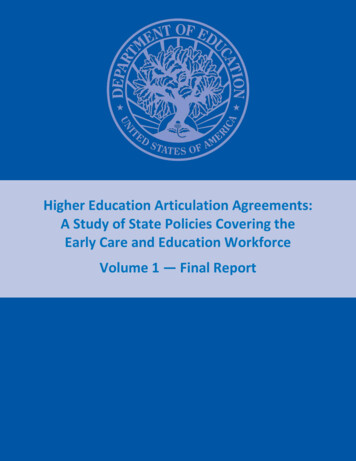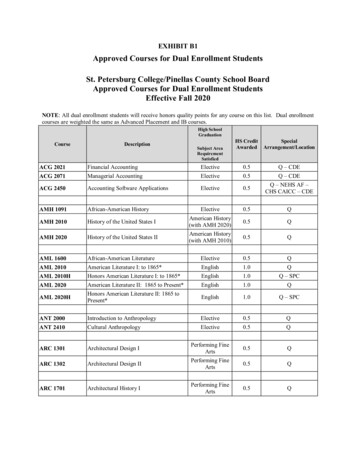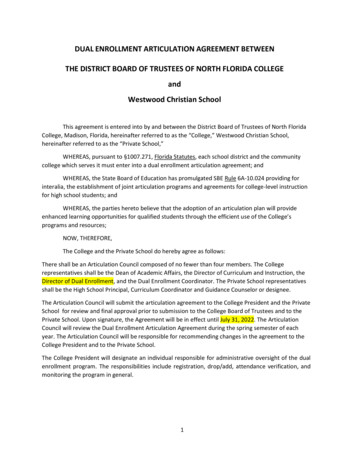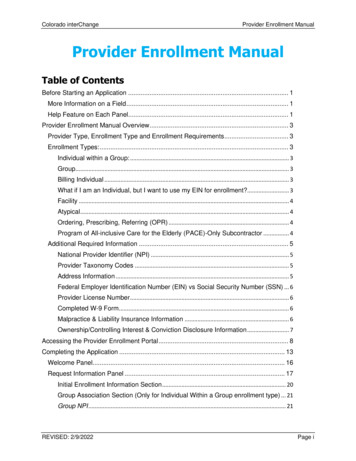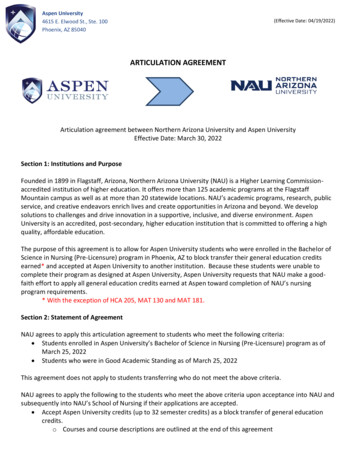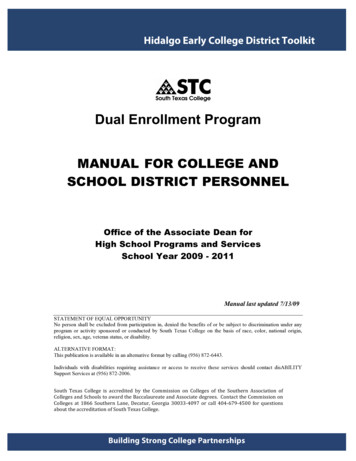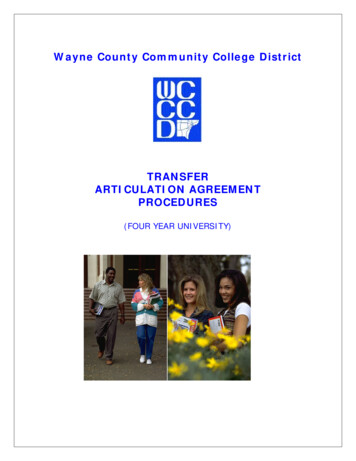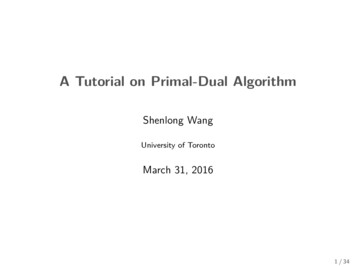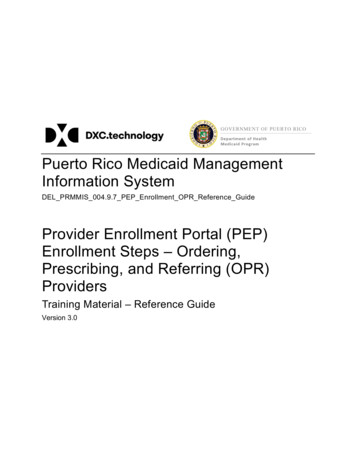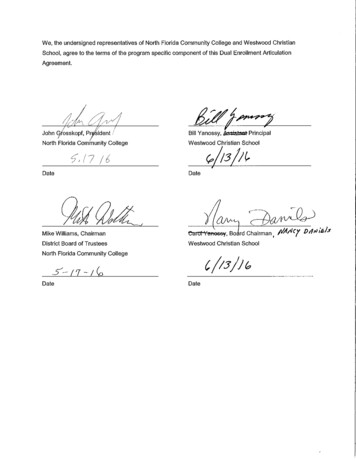
Transcription
DUAL ENROLLMENT ARTICULATION AGREEMENT BETWEENTHE DISTRICT BOARD OF TRUSTEES OF NORTH FLORIDA COMMUNITY COLLEGEandWestwood Christian SchoolThis agreement is entered into by and between the District Board of Trustees of North FloridaCommunity College, Madison, Florida, hereinafter referred to as the “College,” and Westwood ChristianSchool, hereinafter referred to as the “Private School,”WHEREAS, pursuant to §1007.271, Florida Statutes, each school district and the communitycollege which serves it must enter into a dual enrollment articulation agreement; andWHEREAS, the State Board of Education has promulgated SBE Rule 6A-10.024 providing for interalia, the establishment of joint articulation programs and agreements for college-level instruction forhigh school students; andWHEREAS, the parties hereto believe that the adoption of an articulation plan will provideenhanced learning opportunities for qualified students through the efficient use of the College’sprograms and resources;NOW, THEREFORE,The College and the Private School do hereby agree as follows:There shall be an Articulation Council composed of no fewer than four members. The Collegerepresentatives shall be the Dean of Academic Affairs, the Director of Curriculum and Instruction, theDean of Enrollment and Student Services, and the Dual Enrollment Coordinator. The Private Schoolrepresentatives shall be the High School Principal, Curriculum Coordinator and Guidance Counselor ordesignee.The Articulation Council will submit the articulation agreement to the College President and the PrivateSchool for review and final approval prior to submission to the College Board of Trustees and to thePrivate School. Upon signature, the Agreement will be in effect until July 31, 2017. The ArticulationCouncil will review the Dual Enrollment Articulation Agreement during the spring semester of each year.The Articulation Council will be responsible for recommending changes in the agreement to the CollegePresident and to the Private School.The College President will designate an individual responsible for administrative oversight of the dualenrollment program. The responsibilities include registration, drop/add, attendance verification, andmonitoring the program in general.1
1. Ratification or modification of all existing articulation agreementsThis agreement shall be in effect from the date of entering into this agreement until July 31,2017. It shall replace all previous dual enrollment articulation agreements between the parties.2. A description of the process by which students and their parents areinformed about opportunities for student participation in the dualenrollment program.It is the responsibility of the district schools to inform students of the availability of the dualenrollment program, requirements, and currently offered courses through educational planningand guidance process. Each school will advertise dual enrollment through a variety of methods.The district schools shall inform all eligible secondary students and their parents of dualenrollment as an educational option, including eligibility criteria and the process by whichstudents and parents exercise their option to participate.NFCC shall work with the district schools to provide a schedule of classes and will be available tocommunicate directly with parents and students about dual enrollment options. For informationabout NFCC’s Dual Enrollment program call the Dual Enrollment Coordinator at 850-973-1628.The district’s schools will allow College personnel reasonable access to the schools and studentsfor purposes of program information and dissemination. The district will provide staff to assistCollege personnel with facilities and requested instructional equipment.Dual enrollment courses may be taken at the College or at the high school site or at any sitewhere college courses are taught, subject to approval by the high school guidance counselor ordesignee. In addition, eligible secondary school students shall be permitted to enroll in eligiblecourses regardless of delivery method.3. A delineation of courses and programs available to students eligible toparticipate in dual enrollmentFor the purposes of the dual enrollment articulation agreement, the programs articulated underthis agreement include:A. Dual Enrollment §1007.271, Florida Statutes1. Section 1007.271(1) of Florida Statutes says that a “dual enrollment program is theenrollment of an eligible secondary student or home education student in apostsecondary course creditable toward high school completion and a career certificateor an associate or baccalaureate degree. A student who is enrolled in postsecondaryinstruction that is not creditable toward a high school diploma may not be classified as adual enrollment student.”2
2. Students are permitted to enroll in these programs during school hours, after schoolhours, and during the summer term. In addition, eligible secondary school studentsshall be permitted to enroll in eligible courses regardless of delivery method. Anystudent so enrolled shall be exempt from the payment of registration, matriculation,and laboratory fees.3. Part time Dual Enrollment may take up to 11 credit hours per term.B. Early Admission Dual Enrollment, §1007.271(10), Florida StatutesEarly admission is a form of dual enrollment through which eligible secondary studentsenroll in a post-secondary institution on a full-time basis [minimum of 12 credit hoursand a maximum of 15 credit hours per term] in courses that are creditable toward thehigh school diploma and the associate degree. Students who wish to register for morethan 15 credit hours per term need permission of the Dean of Enrollment and StudentServices.C. Career Dual Enrollment, §1007.271(7), Florida Statutes1. Career dual enrollment was established by the Legislature as a positive measure toexpand the scope of the dual enrollment program. Students make take up to 330vocational clock hours per term part time Career Dual Enrollment.2. This type of dual enrollment shall be provided as a curricular option for eligiblesecondary students to earn industry certifications pursuant to 1008.44, FS which countas credits toward the high school diploma.3. For 2016-17, PSAV programs available for eligible secondary students are Automationand Production Program (APT) and Early Childhood Professional Certificate (ECPC).D. Career Early Admission, §1007.271(11), Florida Statutes1. Career early admission is a form of career dual enrollment through which eligiblesecondary students enroll full-time (361- 480 clock hours per term) in postsecondaryprograms leading to industry certifications, as listed in the Postsecondary IndustryCertification Funding List. Students who wish to register for more than 480 vocationalclock hours per term need permission of the Dean of Enrollment and Student Services.For 2016-17, PSAV programs available for eligible secondary students are Automationand Production Program (APT) and Early Childhood Professional Certificate (ECPC).E. Collegiate High School Program, §1007.273, Florida StatutesThe collegiate high school program is an option for public school students in grades 11or 12 to participate in the program for at least 1 full school year, to earn CAPE industrycertification pursuant to §1008.44, and to successfully complete 30 credit hours throughthe dual enrollment program under §1007.271 toward the first year of college for anassociate degree while enrolled in the collegiate high school program. (Appendix A)3
North Florida Community College encourages students who wish to enroll in college creditcourses to concentrate on general education courses. Students who intend to earn an Associatein Arts or Baccalaureate degree should carefully evaluate each course to determine itsapplicability to meeting degree requirements.College Credit Courses are defined as those courses that meet requirements for AdvancedTechnical Diplomas, College Credit Certificates, Associate in Arts, and Associate in Science.4. A description of the process by which students and their parents exerciseoptions to participate in the dual enrollment programThe high school will promote the dual enrollment program by informing students and theirparents about the ramifications of taking college credit courses while in high school. The highschool will provide parents and students who may be eligible to take dual enrollment coursesthe eligibility criteria to apply and register for College courses. Students will be responsible forobtaining the dual enrollment applications and returning the completed application to the highschool counselor. The high school counselor will submit dual enrollment applications to theNFCC Dual Enrollment Coordinator. Students will register for classes through their high schoolcounselor; they may not register online or directly through NFCC staff.Enrollment Process for New Dual Enrollment StudentsStep 1: Meet with your high school guidance counselor to determine dual enrollment options.Step 2: Meet required assessment testing.**Step 3: Complete the NFCC dual enrollment application Student Contract and give to your highschool guidance counselor by published deadline. Requires parent signature.Step 4: If you have acceptable test scores on record (SAT, ACT, PERT, TABE), meet with your highschool guidance counselor to assist with signing up for the appropriate course.Step 5: Complete Dual Enrollment Student Contract. Student and parent signatures arerequired. Your guidance counselor will verify and document your unweighted GPA, grade, andtest scores.Step 6: Complete the NFCC registration form. Guidance counselor signature required. Counselorwill submit form to NFCC for registration during published registration period.Step 7: Confirm registration by logging into the NFCC Information Network.Step 8: Complete college courses with a grade C or better.4
Withdrawing from ClassesStudents must contact their guidance counselor to withdraw from classes. The guidancecounselor will submit the withdrawal with required signature to the Dual EnrollmentCoordinator to withdraw a student from class. Withdrawing from a course after the drop/addperiod counts as an attempt and a final grade of “W” will be reflected on the student’s NFCCtranscript.Maximum Age for Participation in Dual EnrollmentThe maximum age for participation in dual enrollment is 19. Student must not be over age 19 bythe first day of fall semester to participate in dual enrollment for that academic year. Withextenuating circumstances, students may appeal the maximum age limit by submitting a writtenrequest to the Dean of Enrollment and Student Services. The decision of the Dean is final.TestingFor dual enrollment purposes, high school students may test in the NFCC Testing Center. Set upan appointment by emailing testing@nfcc.edu.**2015 Placement ChartCOURSEENC1101COURSE TITLEPREREQUISITEFreshman English IREA 0056 or 0054andENC 0056 or 0054Or ENC 0027OROROr Older Courses:REA 0017andENC 0025MATMGFMGFSTA1033110611072023Intermediate AlgebraLiberal Arts Math ILiberal Arts Math IIIntro College StatisticsMAT 0022 or 0056orMAT 0054 if takenprior to Fall 2015(201610)Or Older Courses:MAT0028CMAC1105College AlgebraMAT 1033MAC1114Trigonometry5ORORTEST SCOREREADING:PERT Reading 106-150CPT Reading 83-120ACT Reading 19SAT Verbal 440-499FCAT Reading 262-ANDWRITING:PERT Writing 103-150CPT Sentence Skills 83-120ACT English 17SAT Verbal 440-499PERT Math 114-122CPT Algebra 72-87ACT Math 19-20SAT Math 440-499PERT Math 123-150CPT Algebra 88-120ACT Math 21-36SAT Math 500-549PERT Math 150
MAC21402233PrecalculusApplied Calculus IMAC 1105OR2311Calculus IMAC 2140 &MAC 1114ORCPT Algebra 100-120ACT Math 25-36SAT Math 550-599PERT Math 150CPT Algebra 110-120ACT Math 30-36SAT Math 600-800DUAL ENROLLMENTPERTCPT(E)ACTSAT-IFCAT Grade10Along with above, H.S. studentsmust meet minimum reading andwriting scores to dual enroll.Reading 106-ANDWriting 103Reading 83-ANDWriting 83Reading 19-ANDEnglish 17Verbal440Reading 2625. A list of an additional initial student eligibility requirements forparticipation in the dual enrollment programAn eligible secondary student is defined in §1007.271(2), Florida Statutes, as a student who isenrolled in a Florida public secondary school or a Florida non-public secondary school. A nonpublic secondary school must be in compliance with §1002.42(2), Florida Statutes, and mustconduct a secondary curriculum pursuant to §1003.428 or §1003.4282, Florida Statutes, in orderfor its students to be eligible to participate in a dual enrollment program. Confirmation ofcompliance must be provided to the College from the non-public institution. Evidence ofcompliance can be a letter attesting that the non-public school complies or the receipt of actualdocumentation, i.e., catalogs, etc.Students must meet the following eligibility criteria: Be enrolled as a student in a Florida public or nonpublic secondary school (grades 6-12),or in a home education program. The College limits eligible students in grades 6-8 toone course per semester. The number of semester hours that an eligible student ingrades 9-12 enrolls each term is at the discretion of the high school counselor. TheCollege recommends that eligible students in grades 9 and 10 limit coursework to twocourses per semester and students in grade 11 limit coursework to three courses persemester. Achieve and maintain, with no exceptions, an unweighted 3.0 high school grade point toenroll in college credit courses. Achieve and maintain, with no exceptions, an unweighted 2.0 high school grade point toenroll in career dual enrollment courses/PSAV courses.6
Achieve a minimum score reading and writing preparation through submission ofappropriate placement test scores pursuant to Rule 6A-14.064, Florida AdministrativeCode (F.A.C.). In addition, no student shall be enrolled in a college credit mathematicscourse on a dual enrollment basis unless the student has demonstrated adequatepreparation through submission of appropriate placement test scores. Program admission requirements (Appendix B) for PSAV programs and other DE eligiblelimited access programs. The TABE can be exempted if the student meets cut score on acollege placement test (ACT, SAT, PERT, or CPT). Cannot be scheduled to graduate prior to the completion of the dual enrollment course.Students may not earn more than twelve (12) college credit hours unless they havedemonstrated proficiency in the basic competency areas of reading, writing, andmathematics by a postsecondary readiness assessment or are concurrently enrolled in asecondary course(s) in the basic competency area(s) for which they have been deemeddeficient by the postsecondary readiness assessment.Part-time dual enrolled students may take up to eleven semester hours or 330 vocationalclock hours per term. Eligible secondary students who are considered Early Admission orCareer Early Admission must take a minimum of twelve college credit hours or 360vocational clock hours but no more than 15 college credit hours or 480 vocational clockhours per term. The Private School is responsible for ensuring completion of requirementsfor graduation from high school for students approved for early admission. The admissioncriteria and GPA requirement are the same as regular dual enrollment.The student is responsible for applying for admission and meeting admission requirementsprior to the published deadlines. Incomplete applications will cause delays that mayprevent registration into the desired course or program.The high school guidance office is responsible for verifying that the student has earned therequired scores on the proper placement test(s) in order to register for a specific course(s).The guidance counselor or designee at the high school will sign the registration form toverify that the student is eligible to take the dual enrollment course(s). Students enrolling indual enrollment courses must identify a postsecondary education objective. The DualEnrollment Coordinator will work closely with students and high school guidanceprofessionals in the development of student academic and education plans.Students who enroll in college courses in the summer of their high school graduation mustdo so as degree seeking students rather than dual enrolled students unless the collegecourse begins and ends prior to their high school graduation date and contributes to therequirements necessary for high school graduation.7
6. A delineation of the high school credit earned for the passage of each dualenrollment courseAny course that is contained within the common course numbering system shall be eligible ifnot specifically excluded by Florida Statute, State Board of Education Rule, District Board ofTrustees Policy, or District Board of Education Policy. The high school credit awarded may befound in the 2015-2016 Dual Enrollment Course - High School Subject Area Equivalency Listwhich is available at the Office of Articulation website under Advising Resources.http://www.fldoe.org. (Appendix C)The high school guidance office is responsible for dual enrollment students as to the courseswhich may be used to meet high school graduation requirements.7. A description of the process for informing students and their parents ofcollege-level course expectationsThe Private School and NFCC will work collaboratively to notify students and their parents ofdual enrollment acceleration mechanisms. The NFCC dual enrollment admission application andthe “Dual Enrollment Student Contract” contains language regarding college-level expectations.Both documents require the signatures of the student, the parent/guardian, high schoolcounselor, and the College. The signatures indicates the understanding and agreement to theterms outlined in the application and student contract. All signatures are required prior toprocessing the application.NFCC will also inform students and parents of college-level course expectations through the useof the course syllabus which is given to each student in each college-level course at thebeginning of each semester. The Office of Academic Affairs shall determine course content inaccordance with the Southern Association of Colleges and Schools Commission on Colleges(SACSCOC) criteria and select instructional materials. Course materials and class discussions mayreflect topics not typically included in secondary courses which some parents may object to forminors. Courses will not be modified to accommodate variations in student age and/or maturity.8. The policies and procedures, if any, for determining exceptions to therequired grade point averages on an individual basisNFCC does not allow exceptions to the GPA requirement as specified in Section 1007.271, F.S.9. The registration policies/procedures for dual enrollment courses asdetermined by the postsecondary institution8
Student must complete their registration form with their high school guidance counselor. Theform must be completed with all the required information about course reference numbers(CRNs). The completed registration forms will be given to the Dual Enrollment Coordinator whowill register the students for courses that are available at the time the form is received. Studentswith incomplete applications for admissions, which includes all required signatures, will not beallowed to register. Students will also not be registered if they are missing any other pertinentinformation, such as test scores. It is the responsibility of the high school to ensure that allstudent registrations and test scores are in the Office of the Registrar prior to the publishedregistration period. 2016-17 Deadlines for High Schools are listed below2016-17 Deadlines for High SchoolsSuwannee, Jefferson, HamiltonFall 2016(Classes: August 24 – December 8)RegistrationApplication Deadline**Drop/AddSpring 2017July 11 – August 23August 15August 24 – August 31(Classes: January 4 – April 26)RegistrationApplication Deadline**Drop/AddNovember 14 – January 3December 7January 4 – 11Summer 2017 (Classes: May 8 – July 20)RegistrationApplication Deadline**Drop/AddApril 17 – May 5April 19May 9 – 109
10. Exceptions, if any, to the professional rules, guidelines, and expectationsstated in the faculty or adjunct faculty handbook for the postsecondaryinstitution.NFCC does not make any exception to rules, guidelines, or expectations for faculty members.Criteria for Accreditation:The selection, development, and retention of competent faculty at all academic levels are ofmajor importance to the educational quality of dual enrollment programs. The SouthernAssociation of Colleges and Schools Commission on Colleges (SACSCOC) criteria require thatNFCC provide evidence that it has employed faculty members qualified to accomplish thepurposes of the program and the institution as well as fulfill the intent of SACSCOC accreditationguidelines. Faculty must meet the requirements of SACSCOC criteria for academic andprofessional preparation. According to SACSCOC, requirements for faculty teaching associatedegree courses designed for transfer to a baccalaureate degree are as follows: doctorate ormaster’s degree in the teaching discipline or master’s degree with a concentration in theteaching discipline (a minimum of 18 graduate semester hours in the teaching discipline). Thecredentials for all full-time and adjunct instructors in all programs will be maintained in theoffice of the Chief Academic Officer.North Florida Community College will provide for the orientation, supervision, and evaluation ofall full-time and adjunct instructors. The Director of Curriculum and Instruction, with the involvement of the appropriatedepartment chair, will hold an orientation meeting for adjunct faculty. All adjunctfaculty teaching dual enrollment courses are required to attend.The Director of Curriculum and Instruction will meet with or email the adjunct faculty atleast once each term for the purpose of discussing and clarifying institutional policiesand procedures as well as expectations.The Director of Curriculum and Instruction will partner the adjunct faculty member witha full time faculty member in the same discipline who acts as a content “go to” person.The Director of Curriculum and Instruction will conduct periodic evaluations of theperformance of adjunct faculty members. Such evaluations may include classroomvisitations, assessment of instructional materials including tests and other measures ofstudent progress, and student evaluations of instruction. These evaluations will bemaintained in the Office of Academic Affairs.The faculty handbook is accessible through the NFCC website. All faculty are expectedto adhere to the professional guidelines, rules, and expectations therein.The student handbook is accessible through the NFCC website. The student handbookdetails add/drop and withdrawal policies, student code of conduct, grading policies,critical dates, etc. All faculty are expected to adhere to the professional guidelines,rules, and expectations therein.10
Personnel Assignments: The Dean of Academic Affairs will be responsible for approving faculty to teach dualenrollment courses. The high school is responsible for providing the College ChiefAcademic Officer with the graduate transcripts of a resident faculty member that itdesires to put forward as a possible teacher of NFCC courses.The faculty assigned to teach dual enrollment courses will meet SACSCOC criteria. TheCollege will collaborate with the Private School in making faculty appointments to teachdual enrollment courses at the high school.All NFCC faculty, including those teaching classes meeting in the high schools, will bepaid by the College unless alternate arrangements are agreed upon by the PrivateSchool and the College.There will be an orientation for instructors assigned to teach dual enrollment courses.This will be part of the College preplanning activities and will be directed by the Directorof Curriculum and Instruction.The purpose of the orientation session will be to share important information andinstructional materials that will support and enhance teaching effectiveness.Instructional effectiveness throughout the district remains a high priority for theCollege.11. Exceptions, if any, to the rules, guidelines, and expectations stated in thestudent handbook of the postsecondary institution which apply to facultymembersThe NFCC student handbook does not state any exception to rules, guidelines, or expectationsfor faculty members.12.The responsibilities of the school district regarding the determination ofstudent eligibility before participation in the dual enrollment programand the monitoring of student performance while participating in the dualenrollment program.The high school will designate an individual responsible for serving as the contact person fordual enrollment. The high school will be responsible for the following administrative tasks: Identifying students who may be eligible for and benefit from dual enrollment;Verifying that the student is eligible to register for dual enrollment courses on the basisof documented placement test scores, high school GPA, and readiness for college.Ensuring that student registrations are in the Office of the Registrar in accordance withthe published registration period.Assuring reasonable access to schools and students by College personnel for purposes ofprogram information and dissemination.11
Providing staff to assist College personnel with facilities and requested instructionalequipment.Responding to requests for transcripts for dual enrollment students in a timely manner.Using College adopted textbooks and instructional materials.Adhering to the College calendar. (Appendix D)The evaluation of students and the assigning of grades are the prerogatives and responsibilitiesof the faculty member assigned to teach the class in which the students are enrolled. Themethod for determining the final course grade, including activities to be graded and theirrespective weighting shall be specified in the course syllabus and distributed to the student. Anyunavoidable changes to the grading policies in the syllabus must be communicated in writing toeach student in the course. Instructors may assign only those grades specified in the catalog.The instructor of record must assign all grades in a given course.All faculty at NFCC send “early alerts” to academic advisors three times a semester whenstudents are underperforming in class. The Dual Enrollment Coordinator will send the highschool guidance office a copy of the unsatisfactory performance notice. If more information isneeded, the Dual Enrollment Coordinator will contact the instructor.If an emergency prevents the instructor from assigning final grades, the College departmentchair using original student records, course syllabus, and other appropriate information willassign final grades. Under such circumstances, a written explanation of the situation will beattached to the final grade roster.A student may not be registered in one course and attend another course. (Assuming validreasons for a change from the course for which the student registered, the Drop/Add Form mustbe processed to reflect the actual situation; such paperwork must be processed immediately,not at the end of the term.)Students who earn a grade of D, F, or WF will not be able to register the following semester.After a one semester “sit out”, the student may register with the approval of the high schoolcounselor or designee. Courses in which a grade of D, F, or WF is earned may be repeated onetime for grade forgiveness if approved by the high school counselor or designee.If a dual enrolled student withdraws from a college credit course and receives the grade of “W,"the high school guidance counselor or designee makes the determination whether or not thestudent registers the next term. Any student receiving a “W” grade in a course may repeat thecourse with the approval of the high school counselor or designee.All grades, including “W” grades for withdrawal, count as course attempts and become part ofthe student’s college transcript; they may affect subsequent postsecondary admission andfinancial aid. As dual enrolled, the student is limited to two attempts per course.12
Dual enrollment courses may be taken at the College or at the high school site or at any sitewhere college courses are taught, subject to approval by the high school guidance counselor.Students may lose the opportunity to participate in the dual enrollment program if they aredisruptive to the learning process. Procedure is outlined in NFCC’s Student Handbook.Regular and consistent attendance facilitates student success. Absences beyond the equivalentof two weeks of class are considered to be excessive and thus may impact a student’s coursegrade. Typically, two weeks of class would be 4 class meetings for a three credit hour course onMW or TR. There are no “excused” absences. An absence is an absence, and students areresponsible for material covered during their absence. In addition, if there is no verifiableparticipation within the first week of the term, the student will be dropped from the class fornonattendance. This includes all methods of delivery. PSAV programs may have specificattendance policies. See course syllabi for specific information.13. The responsibilities of the postsecondary institution regarding thetransmission of student grades in dual enrollment courses to the schooldistrict.The College will maintain student records in the Office of the Registrar. The Office of theRegistrar will send student grades to the high school guidance office within ten (10) days of thelast class day of the College term.The College and the Private School shall jointly assume responsibility for the implementationand enforcement of any rights and responsibilities that arise by the creation, maintenance anduse of any "records" and "reports" regarding any high school student
Community College, Madison, Florida, hereinafter referred to as the "College," and Westwood Christian School, hereinafter referred to as the "Private School," WHEREAS, pursuant to §1007.271, Florida Statutes, each school district and the community college which serves it must enter into a dual enrollment articulation agreement; and
